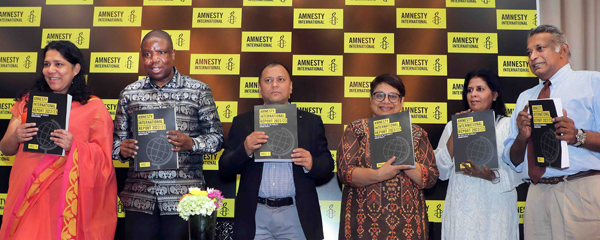When Sri Lanka’s government is responding to the country’s economic crisis, it is important that it does not separate rights obligations with development obligations, stressed Deprose Muchena, Senior Director at Amnesty International. He was speaking to The Sunday Times at the launch of the organisation’s 2022 Annual Report on the state of human rights in the world.
Many governments tend to choose development over rights, Mr Muchena observed. Pronounced absence of human rights in a development context however, materially affects development itself. This is because accountability, empowerment and questions of expression come only when people are able to meet to discuss the impact of development policies themselves.
“In Sri Lanka it is important that we have both human rights protection and leadership as well as development initiatives that could come through the government’s own macroeconomic policy strategies or partnering with its development partners,” he said. With respect to the International Monetary Fund (IMF), Mr Muchena noted Amnesty has been calling for transparency and accountability on the manner in which the deal with the IMF and its programme is implemented. “We have not studied the substantive detail of the (IMF) programme, but we will be monitoring the implementation in order to be able to comment on it effectively.”
At the end of the day, international development assistance that come to Sri Lanka should not diminish human rights, it should advance human rights, he emphasised. Accordingly, the role of Amnesty International and civil society partners and the human rights movement is to hold governments to account for the promise that they make under international law and also under domestic law. “That is our primary principle.”
The government has an obligation under international law to protect its own people - all of them, said Mr Muchena. As such, the government, like other governments Amnesty is seeing in the South Asian region, should not deploy repressive legislation as an instrument of political accumulation, he added. Moreover, the government cannot team up with others that are operating authoritarian projects in their own countries and copy legislation from them and implement here.
Stressing that Sri Lanka’s protest movement was a seminal point in the life of the country, the Amnesty official said they are calling on the government to use human rights standards which are guaranteed under international human rights law as the basis of protecting and responding to a protest movement that is clearly raising issues that are of concern in the country. “That is our call to the Sri Lankan government and it cannot escape international censure if it moves away from the path of human rights protection, promotion and defence,” he asserted.
By Sandun Jayawardana

Leave Comments